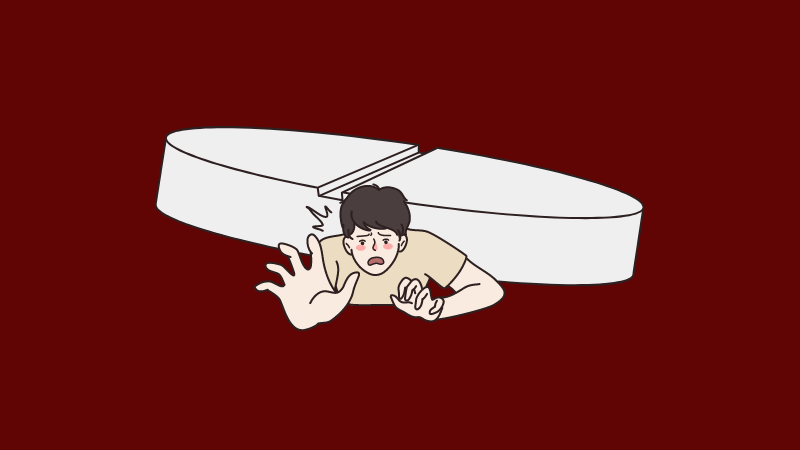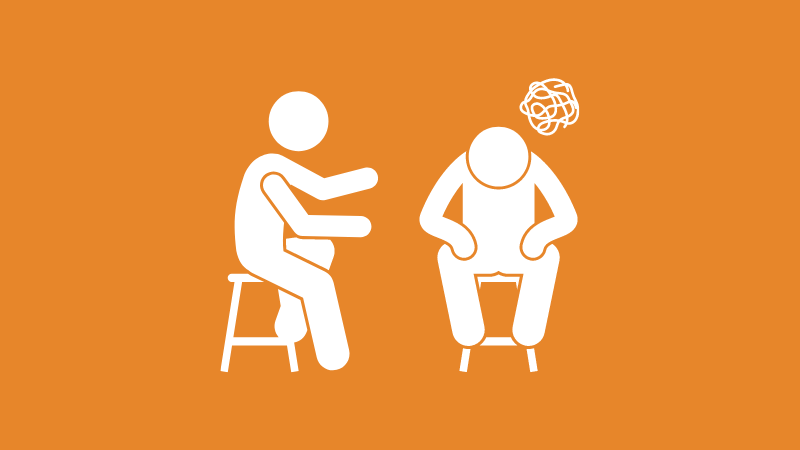Table of Contents
Affiliate link notice: As an affiliate of BetterHelp and other third-party vendors, We will receive compensation if you make a purchase using the links provided on this page. For more information, visit our disclosure page.
Last Updated on May 13, 2023 by Randy Withers, LCMHC
Therapists are in the business of helping others cope with stress, trauma, and emotional challenges. But if you are a therapist, how do you help yourself?
Being a therapist can be rewarding, but also exhausting and stressful. You are exposed to the pain and suffering of your clients, and you may also face organizational, financial, and personal pressures that can affect your well-being.
Therapist burnout is a serious issue that can impact not only your health and happiness, but also your ability to provide quality care to your clients.

What Is Burnout?
Burnout is a state of mental, physical, and emotional exhaustion that occurs when the demands of work outweigh the resources available to cope with them. Burnout can lead to symptoms such as:
- Feeling tired, drained, or overwhelmed
- Losing interest or motivation in work
- Feeling detached, cynical, or negative about work or clients
- Experiencing a decline in performance or quality of care
- Having difficulty concentrating, remembering, or making decisions
- Feeling irritable, frustrated, or angry
- Having trouble sleeping, eating, or relaxing
- Developing physical or mental health problems
Burnout can have serious consequences for both you and your clients. It can affect your empathy, compassion, and rapport with clients, which are essential for effective therapy.
Therapist burnout can also increase the risk of ethical violations, malpractice, and lead to a lower quality of care. It can also harm your personal and professional relationships, and sabotage your sense of meaning and purpose.
How To Prevent Therapist Burnout: 13 Strategies That Work
Fortunately, therapist burnout is not inevitable. There are many ways that you can prevent burnout and protect your well-being.
Here are 13 tips that can help you avoid burnout and stay healthy and happy in your work.
Key Takeaways
- Therapist burnout is a serious issue that can harm your health and happiness, as well as your ability to help your clients.
- You can avoid therapist burnout by taking care of yourself and your work in various ways that can enhance your well-being and resilience.
- These ways include: protecting your well-being, setting boundaries and self-care, seeking feedback and support, managing workload and time, cultivating positivity and growth, diversifying work and finding balance, practicing what you preach and having support.
1. Know the signs and causes of therapist burnout
The first step to prevent therapist burnout is to recognize the signs and causes of it. You should be aware of the common symptoms of burnout and monitor your own mental and physical health regularly. You should also identify the sources of stress and pressure that contribute to burnout in your work.
Some of the common causes of therapist burnout include:
- Current political, social, and pandemic-related stressors
- Inability to detach from clients’ issues and concerns
- Secondary trauma or vicarious trauma
- Exposure to aggressive, depressed, or suicidal clients
- Emotional fatigue
- Focusing on others’ needs rather than your own
- Being on call for extended periods of time
- Administrative task build-up
- Financial stress
- Client emergencies and crises
By knowing the signs and causes of burnout, you can take proactive steps to address them before they become overwhelming.
2. Set healthy boundaries
Boundaries are the limits that you set to protect yourself and your clients from harm or exploitation. Boundaries can include:
- The length and frequency of sessions
- The scope and goals of therapy
- The fees and payment policies
- The availability and communication methods outside of sessions
- The roles and responsibilities of you and your client
- The ethical standards and codes of conduct
Setting realistic and healthy boundaries can help you prevent burnout by:
- Reducing role confusion and role conflict
- Clarifying expectations and avoiding misunderstandings
- Maintaining professionalism and avoiding dual relationships
- Preserving time and energy for self-care and other activities
- Enhancing trust and respect in the therapeutic relationship
You should communicate your boundaries clearly and consistently to your clients, colleagues, supervisors, and employers. You should also respect the boundaries of others and seek feedback if you are unsure about any boundary issues.
3. Practice self-care regularly
Self-care is the practice of taking care of your own physical, mental, emotional, social, and spiritual needs. Self-care is not selfish or indulgent; it is essential for well-being and resilience. Self-care can help prevent therapist burnout by:
- Reducing stress and enhancing relaxation
- Boosting mood and energy levels
- Improving health and immunity
- Increasing self-awareness and self-esteem
- Nurturing creativity and passion
Self-care can include a variety of activities that suit your preferences and lifestyle. Some examples of self-care activities are:
- Getting enough sleep and rest
- Eating well-balanced meals and staying hydrated
- Exercising regularly and staying active
- Meditating, breathing deeply, or practicing mindfulness
- Engaging in hobbies or interests that bring joy and fulfillment
- Spending time with friends, family, or pets
- Seeking support from a therapist, coach, mentor, or peer group
- Taking breaks, vacations, or sabbaticals
- Learning new skills or exploring new opportunities
You should practice self-care regularly and make it a priority in your schedule. You should also be flexible and adaptable to your changing needs and circumstances.
4. Seek Clinical supervision
Supervision provides feedback, guidance, and advice from a more experienced or qualified colleague. It helps by:
- Enhancing your skills and knowledge
- Improving your confidence and competence
- Addressing any challenges or difficulties in your work
- Resolving any ethical dilemmas or conflicts
- Processing any emotional reactions or countertransference issues
- Preventing isolation and fostering collegiality
You should seek supervision regularly. Choose a supervisor or consultant who is trustworthy, supportive, and respectful. Be open and honest about your concerns and goals, and be willing to receive constructive feedback.
5. Manage your workload and time
Effective time management is a skill that helps you organize and prioritize tasks and responsibilities in an efficient and effective way. This helps by:
- Reducing stress and anxiety
- Increasing productivity and quality of work
- Avoiding procrastination and distraction
- Balancing work and personal life
- Achieving short-term and long-term goals
You can manage your workload and time by:
- Setting realistic and attainable goals
- Planning ahead and creating a schedule
- Delegating or outsourcing tasks when possible
- Saying no to unnecessary or unreasonable requests
- Using technology or tools to streamline tasks
- Reviewing and evaluating your progress and outcomes
Monitor your workload and time regularly and make adjustments as needed. Seek help or support if you feel overwhelmed or stuck.
6. Cultivate a positive mindset
A positive mindset is a way of thinking that focuses on the positive aspects of your work, life, and self. A positive mindset can help prevent therapist burnout by:
- Enhancing motivation and engagement
- Increasing optimism and hope
- Fostering gratitude and appreciation
- Strengthening resilience and coping skills
- Improving mental health and well-being
You can cultivate a positive mindset by:
- Challenging and reframing negative thoughts
- Affirming and celebrating your strengths and achievements
- Seeking and giving positive feedback and recognition
- Learning from failures and mistakes
- Finding meaning and purpose in your work
You should also surround yourself with positive people and environments that support your growth and happiness.
7. Prioritize Learning and Growth
Never stop acquiring new knowledge, skills, and experiences that enhance your personal or professional development. Such growth can help prevent therapist burnout by:
- Stimulating curiosity and interest
- Expanding horizons and perspectives
- Increasing competence and confidence
- Enriching creativity and innovation
- Renewing passion and enthusiasm
You can keep learning and growing by:
- Reading books, articles, or blogs
- Taking courses, workshops, or webinars
- Attending conferences, seminars, or events
- Joining professional associations or networks
- Seeking mentorship or coaching
You should also embrace a growth mindset that views challenges as opportunities to learn and improve.
8. Diversify your work
If your work has become mundane or tedious, consider the benefit of adding variety or diversity to your work activities or roles. These types of changes can help by:
- Reducing boredom and monotony
- Increasing stimulation and challenge
- Enhancing satisfaction and fulfillment
- Leveraging your strengths and talents
- Exploring your interests and passions
You can diversify your work by:
- Working with different populations or settings
- Offering different services or modalities
- Developing new skills or specialties
- Engaging in research or teaching
- Pursuing other projects or ventures
You should also be mindful of your workload and time when diversifying your work, and avoid taking on too much, especially if you are already overextended.
9. Invest In your Own Therapy
Therapy is not only for your clients. As a therapist, you may face many personal or professional issues that can affect your well-being and performance. You may also experience emotional distress or trauma from working with challenging or vulnerable clients. Effective therapy can help by:
- Providing a safe and confidential space to express your feelings and thoughts
- Helping you cope with stress, anxiety, depression, or other mental health issues
- Supporting you in resolving any personal or interpersonal conflicts or problems
- Helping you heal from any secondary or vicarious trauma
- Enhancing your self-awareness and self-esteem
Seek therapy from a qualified and experienced therapist who is not your colleague, supervisor, or friend. You should also choose a therapist who is compatible with your personality, style, and goals. Lastly, be honest with your therapist about your needs and expectations.
Seeking therapy is a sign of strength and courage. It’s also a sign of professionalism and responsibility. By seeking help, you are taking care of yourself and your clients.
10. Build a support system
Having a network of people who provide emotional, practical, or professional support is a critical component of self care. A strong support system helps prevent therapist burnout by:
- Reducing isolation and loneliness
- Increasing social support and belonging
- Providing comfort and encouragement
- Offering advice or guidance
- Sharing experiences and insights
You can build a support system by:
- Maintaining close relationships with friends, family, or partners
- Joining or forming peer groups, support groups, or online communities
- Seeking supervision, consultation, or mentorship
- Networking with other professionals or colleagues
- Reaching out to others who are going through similar challenges or situations
Be supportive and respectful of others in your support system, and reciprocate the support you receive.
11. Develop a sense of humor
Humor is terrific medicine. Being able to laugh at yourself or at the absurdities of life is another way to stave off burnout. Humor is great for:
- Reducing stress and tension
- Increasing joy and fun
- Enhancing creativity and flexibility
- Strengthening resilience and coping skills
- Improving relationships and rapport
Learn to find humor in everyday situations. Watch or read funny content. Share jokes with colleagues. And learn to laugh at your own mistakes or flaws.
Humor can also be an effective therapeutic tool or intervention if used correctly. Just be mindful of the appropriateness and timing of humor, and avoid humor that is offensive, insensitive, or harmful.
12. Practice Mindfulness
Mindfulness is the act of paying attention to the present moment with curiosity, openness, and acceptance. It helps by:
- Reducing rumination and worry
- Increasing awareness and clarity
- Enhancing focus and concentration
- Fostering empathy and compassion
- Improving mental health and well-being
You can learn to be more mindful by:
- Practicing meditation, breathing exercises, or mindfulness techniques
- Being fully engaged and attentive in your work and interactions
- Noticing and appreciating the positive aspects of your work and life
- Avoiding multitasking or distractions
- Using mindfulness as a therapeutic tool or intervention
You should also be mindful of your own thoughts, feelings, and sensations, and acknowledge them without judgment or criticism.
13. Remember your “why”
This might seem obvious, but take time to remember the reasons or motivations you became a therapist. Doing so can help:
- Increase motivation and engagement
- Increase optimism and hope
- Foster gratitude and appreciation
- Strengthen resilience and coping skills
- Improve mental health and well-being
In order to get back in touch with your motivations, try:
- Revisiting your personal mission or vision statement
- Reflecting on your values or beliefs
- Recalling your achievements or successes
- Recognizing the impact or difference you make
- Celebrating the milestones or moments that matter
You should also share your why with others who can support you, inspire you, or remind you of it.
Final Thoughts
As a therapist, you have a noble and rewarding profession that helps others heal and grow. But you also have a challenging and demanding profession that can take a toll on your well-being. Therapist burnout is a real and serious issue that can affect your health, happiness, and quality of care.
That’s why it’s vital to take care of yourself as well as your clients. By following the 13 tips in this article, you can prevent burnout and protect your well-being. You can also enhance your skills, performance, and satisfaction in your work.
Remember, self-care is not selfish or indulgent; it’s essential and beneficial. You deserve to be healthy and happy in your work and life. You also owe it to yourself and your clients to provide the best care possible.
FAQ About Therapist Burnout
Q: How many therapists experience burnout?
A: Therapist burnout is unfortunately quite common among mental health professionals. A 2020 study found that 78.9% of therapists suffered from high burnout, and 58.1% experienced high disengagement.
Q: How can I tell if I am experiencing burnout?
A: Some of the common signs and symptoms of burnout are feeling tired, drained, or overwhelmed; losing interest or motivation in work; feeling detached, cynical, or negative about work or clients; experiencing a decline in performance or quality of care; having difficulty concentrating, remembering, or making decisions; feeling irritable, frustrated, or angry; having trouble sleeping, eating, or relaxing; developing physical or mental health problems.
Q: What can I do if I am already burned out?
A: If you are already burned out, you should seek help and support as soon as possible. You should also take some time off from work to rest and recover. You should also implement some of the tips mentioned in this article to prevent burnout from happening again.
Q: How can I prevent burnout from affecting my clients?
A: You can prevent burnout from affecting your clients by maintaining a high level of empathy, compassion, and rapport with them. You should also monitor your own emotional reactions and countertransference issues, and seek supervision or consultation if needed. You should also adhere to the ethical standards and codes of conduct of your profession, and avoid any boundary violations or malpractice.
Q: How can I prevent burnout from affecting my personal life?
A: You can prevent burnout from affecting your personal life by seeking balance and harmony between your work and personal life. You should also practice self-care regularly and make time for yourself and your loved ones. You should also have a support system of people who can provide emotional, practical, or professional support. You should also have a sense of humor and a positive mindset that can help you cope with stress and challenges.
References
- Johnson, J., Gooding, P. A., Wood, A. M., & Tarrier, N. (2020). Resilience to emotional distress in response to failure, error or mistakes: A systematic review. Clinical Psychology Review, 76.
- Delgadillo, J., Saxon, D., & Barkham, M. (2018). Associations between therapists’ occupational burnout and their patients’ depression and anxiety treatment outcomes. Depression and Anxiety, 35(9), 844–850.
- Johnson-Motoyama M., Petr C.G., Mitchell F.M., et al. (2021). Burnout among social workers during COVID‐19: Examining the role of secondary traumatic stress. Journal of Human Behavior in the Social Environment.









